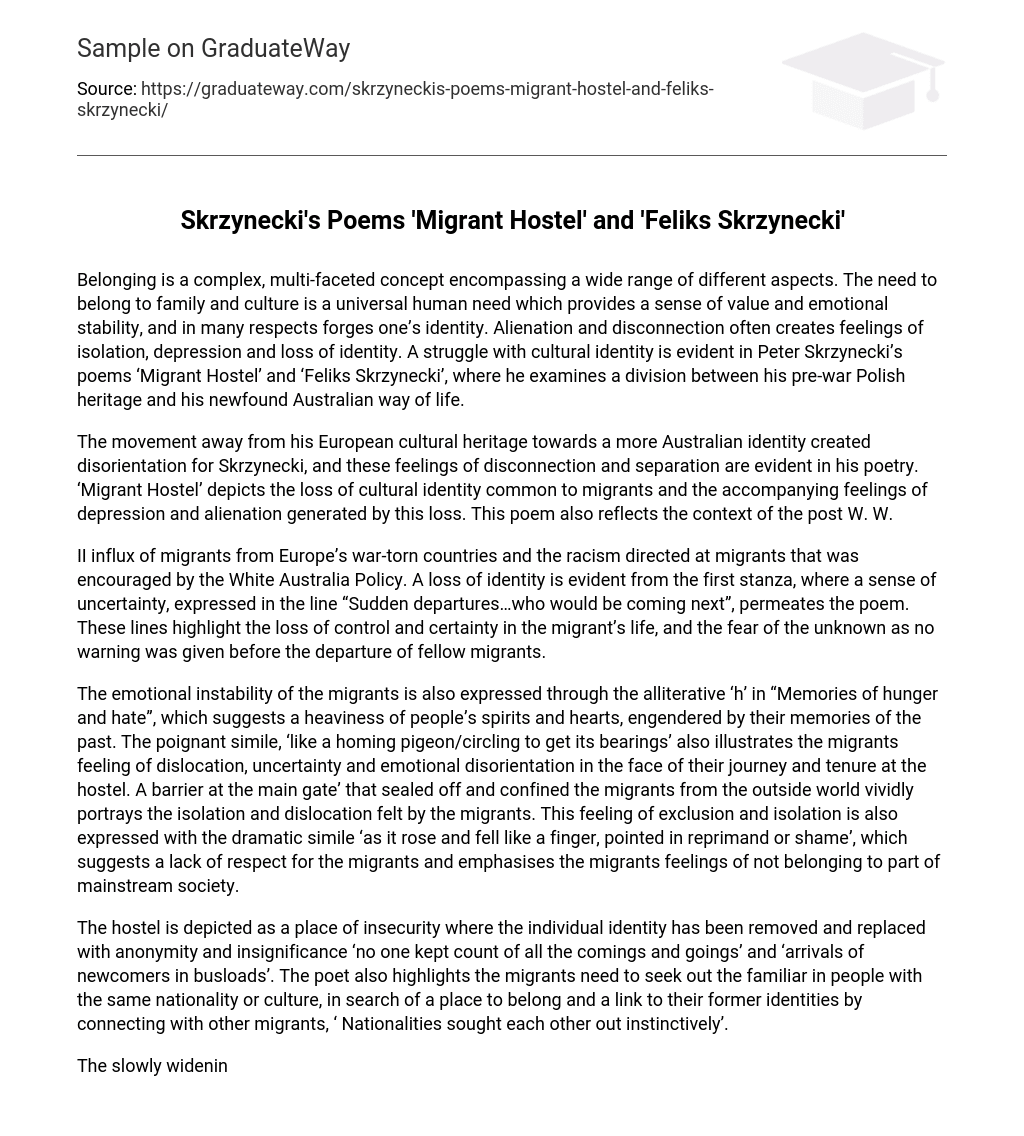Belonging is a complex, multi-faceted concept encompassing a wide range of different aspects. The need to belong to family and culture is a universal human need which provides a sense of value and emotional stability, and in many respects forges one’s identity. Alienation and disconnection often creates feelings of isolation, depression and loss of identity. A struggle with cultural identity is evident in Peter Skrzynecki’s poems ‘Migrant Hostel’ and ‘Feliks Skrzynecki’, where he examines a division between his pre-war Polish heritage and his newfound Australian way of life.
The movement away from his European cultural heritage towards a more Australian identity created disorientation for Skrzynecki, and these feelings of disconnection and separation are evident in his poetry. ‘Migrant Hostel’ depicts the loss of cultural identity common to migrants and the accompanying feelings of depression and alienation generated by this loss. This poem also reflects the context of the post W. W.
II influx of migrants from Europe’s war-torn countries and the racism directed at migrants that was encouraged by the White Australia Policy. A loss of identity is evident from the first stanza, where a sense of uncertainty, expressed in the line “Sudden departures…who would be coming next”, permeates the poem. These lines highlight the loss of control and certainty in the migrant’s life, and the fear of the unknown as no warning was given before the departure of fellow migrants.
The emotional instability of the migrants is also expressed through the alliterative ‘h’ in “Memories of hunger and hate”, which suggests a heaviness of people’s spirits and hearts, engendered by their memories of the past. The poignant simile, ‘like a homing pigeon/circling to get its bearings’ also illustrates the migrants feeling of dislocation, uncertainty and emotional disorientation in the face of their journey and tenure at the hostel. A barrier at the main gate’ that sealed off and confined the migrants from the outside world vividly portrays the isolation and dislocation felt by the migrants. This feeling of exclusion and isolation is also expressed with the dramatic simile ‘as it rose and fell like a finger, pointed in reprimand or shame’, which suggests a lack of respect for the migrants and emphasises the migrants feelings of not belonging to part of mainstream society.
The hostel is depicted as a place of insecurity where the individual identity has been removed and replaced with anonymity and insignificance ‘no one kept count of all the comings and goings’ and ‘arrivals of newcomers in busloads’. The poet also highlights the migrants need to seek out the familiar in people with the same nationality or culture, in search of a place to belong and a link to their former identities by connecting with other migrants, ‘ Nationalities sought each other out instinctively’.
The slowly widening generational gap between father and son and between cultures is explored in “Feliks Skrzynecki”. Although full of tender admiration for his father, who spent “Five years of forced labour in Germany”, the poet comments on his father’s strong need to focus only on his pre-war Polish culture, choosing to purposefully exclude himself from main-stream Australian society.
Ironically, this caused a growing distance between father and son, as although his father feels he does belong and is content in his exclusion from Australian culture and society, Skrzynecki Another basis for tension was the different experiences faced by both Peter and Feliks Skrzynecki. Feliks’ exposure to a slave labour camp and the war meant that he was much more inclined to maintain his cultural connection. This created a growing distance and cultural disconnection between the poet and his father, symbolised in the evocative metaphor “Watched me pegging my tents/Further and further south of Hadrian’s Wall”.
The cultural disconnection and disorientation felt by Peter Skrzynecki is evident in many of his poems and his use of imagery, symbolism and figurative devices helps the reader to empathise with him. The desire to belong to the Australian culture yet still remember his Polish heritage created a divide between his father and himself and caused cultural and familial confusion. This confusion is the subject of these two poems and highlights the importance of the universal human need to forge our identities and to belong to a family and a culture.





